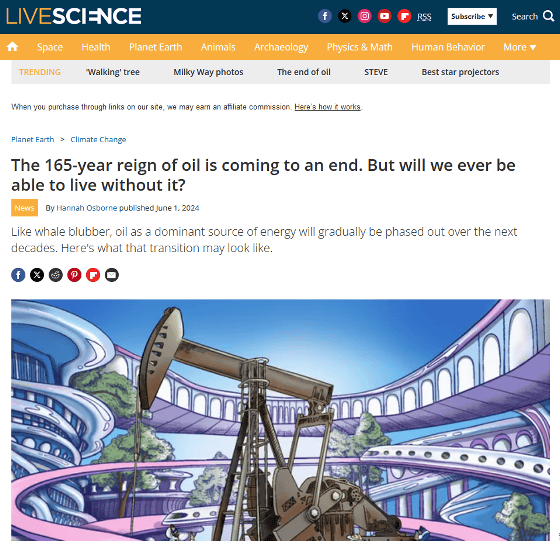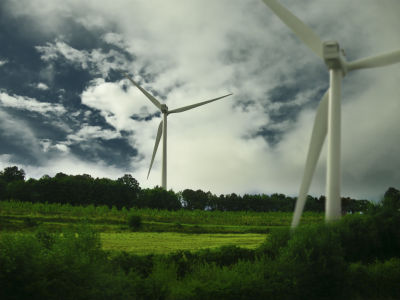Can humanity survive without oil?

In modern society,
The 165-year reign of oil is coming to an end. But will we ever be able to live without it? | Live Science
https://www.livescience.com/planet-earth/climate-change/the-165-year-reign-of-oil-is-coming-to-an-end-but-will-we-ever-be-able-to-live-without-it

From the 17th to the 19th century, before the use of petroleum became common, humans hunted millions of whales commercially and used the whale oil from their carcasses as fuel, machine lubricants, food ingredients, etc. Society at that time would not have been able to function without large-scale commercial whaling, but at the time of writing, commercial whaling is largely banned, and yet humans are able to live their social lives.
Society can now function without commercial whaling because it has become possible to produce sufficient fuel and raw materials other than whale oil. In recent years, there has been an urgent need to reduce the use of petroleum as a measure against climate change, and technological innovations are being made to transition to energy sources other than petroleum, so it seems that a 'society without petroleum' will eventually come about. In explaining whether humanity can really live without petroleum, Live Science goes back in time to explain the history of petroleum.
The Rise of Oil
In fact, humans have only been using petroleum for a few hundred years now. It is known that people living in modern-day Syria made tools using natural asphalt , a by-product of crude oil, about 40,000 years ago. The Mesopotamians used a similar substance to waterproof boats, the Babylonians used it for buildings, and the Egyptians used it to embalm mummies. Furthermore, the Chinese burned crude oil for heat and lighting from around 500 BC, and transported petroleum in bamboo pipes in the 4th century AD.
However, it is said that oil first became in demand on a large scale in 1859 when American Edwin Drake used machinery to drill for oil in Pennsylvania, extracting oil from a reservoir 21 meters underground. Drake's oil field marked the beginning of the modern oil industry, and oil is now indispensable in a wide range of fields, from transportation and logistics, to power generation, manufacturing, agriculture, and medicine.

◆Automobiles, aircraft, ships
Some industries are already moving away from oil. For example, the proportion of fossil fuels used in power generation is on the decline, especially in developed countries, and the proportion of fossil fuels in Japan's domestic power generation is expected
The following graph released by the International Energy Agency shows the use of petroleum in the world in 2018. As of 2018, vehicles such as cars and motorcycles accounted for about 50% of the total, but it is estimated that about two-thirds of the global automobile market will be electric vehicles by 2030, and petroleum use by vehicles is expected to plummet over the next few decades.

Improvements are also being made in the aviation industry, which relies heavily on petroleum for fuel, and modern aircraft are much more fuel efficient than aircraft from about 40 years ago. Increasing the use of
On the other hand, the shipping industry is considered to be the most difficult to replace petroleum fuels. The large ships that carry the world's logistics are extremely expensive to build, so it is difficult to replace existing ships with energy-efficient ships or ships that can use fuels other than petroleum. Tests are also underway on ferries and small ships that use hydrogen fuel as an alternative to petroleum, but large ocean-going ships that use hydrogen fuel are still in the design stage, so the shipping industry is expected to consume large amounts of petroleum for the next few decades.

◆Plastic
Plastics made from petroleum are very cheap, durable, and versatile, so they are used in a wide range of fields, including food packaging and medical equipment, and some plastic products cannot easily be replaced by other products.
Plastic products, especially disposable syringes, IV bags, catheters, disposable gloves, bed sheets, etc., are used throughout hospitals. Plastic products are not only cheap and durable, but also sterile, which makes them useful in preventing the spread of infectious diseases, so they are expected to continue to be used in the medical field in the future.
At the time of writing, petroleum-based plastics are so cheap that petroleum-free plastic products cannot compete in terms of cost. Bioplastics made from plants and other raw materials are seen as a promising alternative, but it takes a lot of farmland to grow soybeans, which are bio-based raw materials, and focusing too much on biomass could affect human food production, so solving the problem is not easy.

The beginning of the end of the oil-based society
If technology continues to advance, at some point clean energy technologies like solar and wind power will become so cheap that it will no longer be worth the high costs of drilling for oil. First, drilling to explore unknown oil fields, which is dangerous and expensive, will no longer be done, and eventually normal drilling will no longer be cost-effective.
Oil production is expected to continue, mainly in Saudi Arabia and the United States, for the next few decades, but Femke Neisse , a complexity scientist at the University of Exeter in the UK, expects global oil use to be reduced by 95% by 2065. When that happens, she predicts that aviation and shipping will be the last major industries that use a lot of oil.
Science media Live Science said, 'Pushing ahead with decarbonization means that oil will become a passing phase in our history. Our preference for oil will fade away, and only a few outposts, like industrial whaling, will remain. 50 to 100 years from now, America's oil rigs and drilling sites may look like abandoned mine museums and Gold Rush ghost towns scattered across the West.'
Related Posts:







